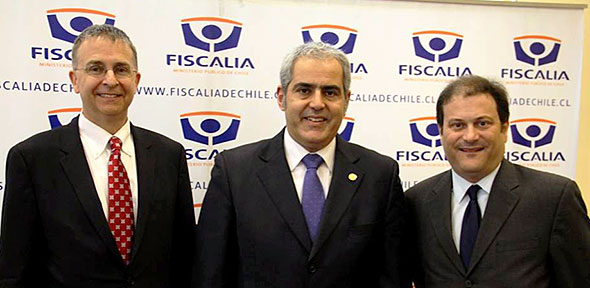
 |
|
Dean Schaumann with Sabas Chahuán, Attorney General of Chile, and Professor James M. Cooper in Santiago, after signing an agreement between the law school and the office of Chile's top prosecutor in October 2013
|
The beginning was modest: in 1998, a passionate professor at California Western offered to help train a handful of Chile’s first-ever public defenders as that country transitioned from a repressive inquisitorial judicial system leftover from the Pinochet dictatorship, to the more modern and transparent adversarial system found in the U.S. and other democracies.
How proud the late Professor Janeen Kerper, who died in 2003, would be if she could see how her vision has matured. California Western faculty and students used that foothold to successfully help reform Chile’s judicial system. Today, 15 years later, the school’s effort has expanded to 21 Latin American countries through Proyecto ACCESO, a program which has evolved into one of the most ambitious and effective international legal assistance and public education projects ever attempted by an independent American law school.
Proyecto ACCESO-whose Spanish acronym translates to “Creative Lawyers Collaborating to Find Optimal Solutions Project,” promotes the rule of law and judicial reform by training thousands of private lawyers, public defenders, prosecutors, judges, law enforcement agents, and community leaders with the trial and other legal skills they need to promote sustainable reforms in their respective countries.
Kerper’s colleague, Professor James M. Cooper, Assistant Dean for Mission Development, Center for Creative Problem Solving; and Director, Proyecto ACCESO, worked closely with his mentor in those early days and recalls how astute her timing was.
“Professor Kerper knew that as Chile and other Latin American countries moved away from dictatorships toward democracy, there would be a critical need to reform judicial systems left over from the Spanish conquistadors and the Spanish Inquisition,” Cooper says. “Oral hearings are not allowed in an inquisitorial system. Judges gather evidence and hand down the sentences, with the accused having no right to confront their accusers.
“That’s why all of us at Proyecto ACCESO are so excited because we really have played a crucial role in helping move legal systems from the darkness to the light, changing centuries of corrupt, opaque, and inherently unfair criminal and other procedures,” Cooper says. “California Western’s investment in this program has had an immense payoff in making legal systems in the Americas more transparent, accountable, and accessible to all.”
For California Western students-especially for those participating in programs like the Chile Summer Program-the school’s Latin America effort has offered a unique learning opportunity, both academically and practically, to observe and participate in true legal reform that has a measurable impact on the lives of citizens.
“Our students get the most amazing close-up view of another country’s legal system,” Cooper says. “Just the other day, Chile’s attorney general asked two of our students, Rafael Ortado and Adriana Quintero, if they wanted to drive with him in his car to the Chilean congress to watch him propose a new law. Can you imagine Eric Holder driving a student over to Congress?”
In recent years, Proyecto ACCESO’s scope has expanded rapidly, spawning separate projects to help create innocence projects to free the wrongfully convicted; promote rights for marginalized and dispossessed indigenous groups; raise awareness of intellectual property rights and challenges caused by counterfeit products; promote the use of DNA and other technologies to make legal and law enforcement systems fairer and more efficient; and launch an effort to assist environmental law reform throughout the region.
“The innocence projects California Western helped start over the past two years in Argentina, Chile, Puerto Rico, and Mexico are a good example of how the school’s effort in Latin America continues to grow organically as more legal needs are discovered,” says Professor Justin Brooks, Director of the California Innocence Project and Institute for Criminal Defense Advocacy, both based at California Western. “In order to create a structure for innocence work in Latin America we created Redinocente, which means innocent network in Spanish (www.redinocente.org) Given the many decades of inquisitorial justice in Latin America, and the resulting huge number of wrongful convictions and false imprisonment, there’s an even greater need for innocence projects in Latin American than the U.S.”
“There are great challenges,” Brooks says, “but even greater opportunities to accomplish amazing things. There is no better feeling for a lawyer than to give someone their life back after it was wrongfully taken away. It’s encouraging that the Argentina project has already had its first exoneration and I anticipate we’ll see a lot more as these projects develop in Latin America and many more innocent people going home.”
For Brooks, California Western’s long and deep commitment to improving the legal skills of Latin American lawyers and law students is at once both an obligation and a privilege.
“It’s important to recognize where California Western sits on the planet,” Brooks says. “We border Mexico, and by extension, all of Latin America. Given that, and the fact that our own country’s Latino population is the fastest growing segment, we have a responsibility to our students and our community to engage in as many cross-cultural educational activities as we can.”
BOB ROSS // RES IPSA ONLINE